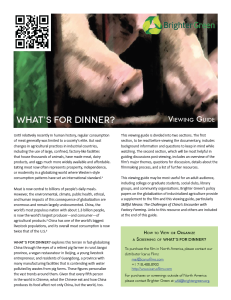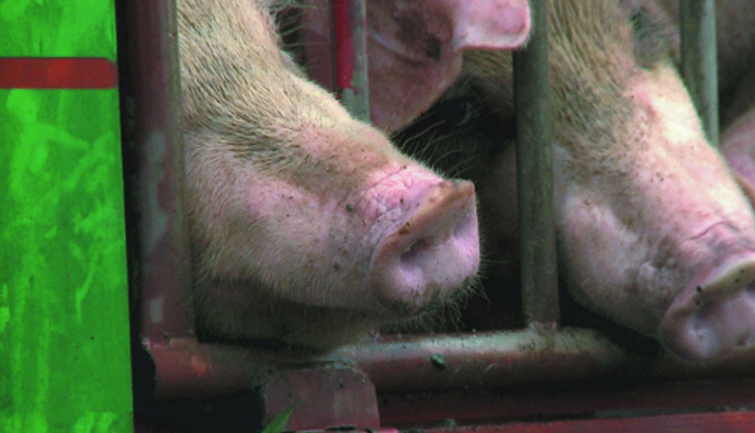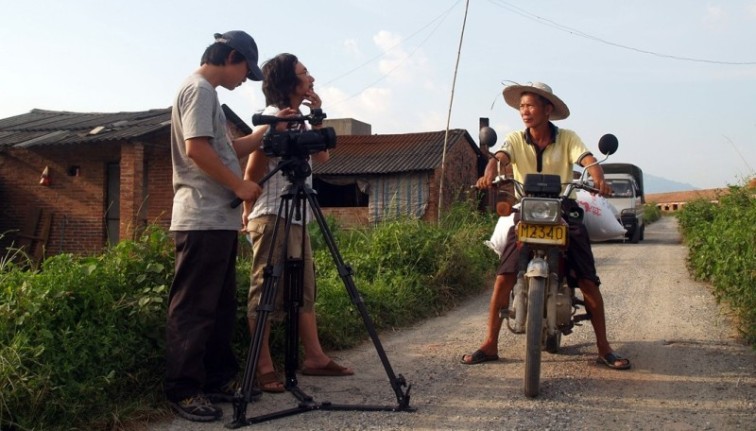What’s For Dinner? examines the rapidly increasing consumption of animal-based foods in China that has mirrored the country’s swift economic growth in recent years. Average pork consumption has doubled over the past ten years, with both western and home-grown fast food chains becoming commonplace in urban centers and creating a $28 billion-a-year market in the country. None of this would be possible without the adoption of U.S.-style systems of intensive production.
But strains are showing: manure run-off from so-called “factory farms” housing thousands of pigs, chickens, and ducks is fouling groundwater and rivers; only two generations after a national famine killed millions, nearly a quarter of Chinese adults and a fifth of Chinese children are overweight or obese; and diet-related chronic diseases now kill more people in China than any other cause.
In the film (29 minutes, Mandarin and various Chinese dialects with English subtitles), award-winning independent director Jian Yi captures the shift in how China eats and produces food through interviews with people across Chinese society – such as Zhou Shuzhen, a retired pig farmer from Jiangxi province; Wang Ronghua, a young livestock entrepreneur who’s expanding his pig and poultry farms; and Wen Bo, one of China’s leading environmentalists.
The film offers a unique look into China’s rapidly changing food and agricultural landscape and sheds light on some of its consequences for public health, sustainability, the environment, climate change, and animal welfare. Much of the footage documents places, people, and events that have never been filmed before in China.
The Cast

Xiao Muxiu is a pig farmer at Ten Thousand Pig Farm, whose small-scale business is threatened by the fluctuating price of pork.
Wu Xiaohong works in Beijing on animal welfare issues.
Yi Shengming is a pig farmer in Yi village, near Ji’an City in Jianxi province.
Wang Ronghua is a young livestock entrepreneur who has invested in pig and poultry farms. He is building a new, expanded pig facility in his hometown.
Yu Li is the owner of Vegan Hut, a health-conscious restaurant in Beijing, which he opened after reading about the significant role of livestock in global warming in the 2006 UN report, Livestock’s Long Shadow.
Xie Zheng is a pop star and activist who founded the vegetarian advocacy group, “Don’t Eat Friends”.
Dr. Tian Yongsheng is a government official who worries about the ecological impacts of feeding a growing livestock population.
Wen Bo is one of China’s leading environmentalists, working for National Geographic’s Global Exploration Fund for China.
Xie Hongying owns Donald Tucky restaurant, a home-grown Chinese fast food outlet in Ji’an City.
The Crew
What’s For Dinner? is directed by award-winning filmmaker Jian Yi who led an all-Chinese crew that included assistant director Eva Song, producer Douglas Xiao, and cinematographer Pan Kewu. Brighter Green also collaborated with Karin Chien of dGenerate Films, and Susannah Ludwig of Snapdragon Films.
Jian Yi is an independent filmmaker and cultural activist who is interested in religion, education, environmental conservation, globalization, and unofficial history. In 2009, he founded IFChina Original Studio, a non-profit independent organization focusing on collecting and documenting social memories. Jian taught at the Communication University of China for five years before his three-year appointment with an E.U. program focusing on China’s village governance. He is a Yale World Fellow (2009), an Asian Cultural Council grantee (2008), an India-China Fellow at the New School University (2008-2010), and a visiting fellow at Cambridge University. Jian’s films have won international awards including the Bronze Zenith at the 31st Montreal World Film Festival, and have been shown at numerous venues across the globe including New York’s Museum of Modern Art (MoMA), United Nations conference forums, and university campuses. He has served as a jury member and mentor at international film festivals and spoken at numerous venues including the artists’ series at the Apple Store Beijing. Jian received Master’s degrees from the Beijing Broadcasting Institute (now Communication University of China) and the University of Notre Dame. Jian and his wife, Eva Song, have been vegetarians (mostly vegans) for more than five years and are proud parents of a healthy and lovely vegetarian baby boy.
What’s For Dinner? Director Interview
Reviews and Endorsements
“A film about meat production in China does not on the surface sound like compelling, ‘must see’ cinema, but it is. In China nothing is done on a small-scale, so the exploding growth in meat consumption has created staggering levels of water pollution from factory farms. ‘What’s For Dinner?’ doesn’t preach, but rather lets the story unfold through conversations with farmers, meat processors talking about their booming business, shoppers at the market, and communities angered by their fouled rivers. Go see this film.”
—Jennifer Turner
Director, China Environment Forum, Woodrow Wilson Center
“Pork production in China is growing fast, and shifting from households feeding their leftovers to a few animals to US-style industrial operations with thousands of pigs raised on a diet of commercial feed and drugs. In recent years, researchers and activists in and out of China have described an analyzed this trend on paper, but ‘What’s For Dinner?’ shows us the process firsthand… the filmmaker and various experts provide the larger context of the small stories depicted in the film.”
—Jim Harkness
Senior Advisor on China, Institute for Agriculture and Trade Policy (IATP), full review available here
“The production and consumption of meat in China is a global issue, not a local one. Jian Yi’s ‘What’s For Dinner?’ is a thought-provoking film that looks at this question of the effect Chinese meat production has on the world and provides some startling information on the seriousness of this issue. People are consuming meat seemingly faster than it can be produced as meat in China has become a status symbol—a sign of wealth and modernity, the likes of which weren’t seen thirty years ago when meat was not even an option for most people in China. ‘What’s For Dinner?’ explores the implications of this changing reality in China as well as offers some answers on what we can do to help. Meat consumption won’t go away entirely but the way we eat, buy and produce it can and needs to change—for this reason, ‘What’s For Dinner?’ is crucial for informing the public and upending this status quo.”
—Christopher Quinn
Director of upcoming documentary adaptation of Jonathan Safran Foer’s “Eating Animals”
“We often read about the environmental and health impacts of food production in the US, but what about in rapidly growing China? ‘What’s For Dinner?’ introduces us to the challenges of large-scale animal agriculture in China. It surveys the ‘big picture’ – food shortages, industrialization, and environmental impact – through a set of clear, engaging interviews and personal stories. This is an excellent film for environmental studies or other students interested in the origins and impacts posed by animal agriculture in a global context.”
—Christopher P. Schlottmann
Clinical Associate Professor of Environmental Studies; Associate Director of Environmental Studies; Director of Undergraduate Studies; Global Curriculum Coordinator; Director of Departmental Honors; Affiliated Professor of Bioethics, New York University
“‘What’s For Dinner?’ delivers an insightful presentation of the many challenges posed by China’s expanding animal agriculture. China had a history of serious food deprivation and food security is an obsession of the Chinese government. It is time, however, that China adopts a new outlook on food security that is more efficient and achievable without subjecting a staggering number of livestock on farms with shocking and perhaps irreparable environmental and ecological consequences. The solution is to promote plant-based food choices in the interest of public health, environment and animal welfare. ‘What’s For Dinner?’ explores this set of complex, interrelated issues and challenges in a rigorous yet engaging manner. The film is particularly good material for students in my Chinese Politics class.”
—Peter J. Li
Associate Professor of East Asian Politics; Department of Political Science, University of Houston-Downtown
“‘What’s For Dinner?’ is an urgent and compelling documentary about the globalization of industrial meat production. It documents the consequences of rising meat consumption in China, detailing its impact on health, labor, animal welfare, and the environment. The film is a significant addition to the growing number of films and texts about food politics, offering a much-needed look at non-Western experiences and the global dimensions of industrial agriculture. Having screened it in my own courses on food and animal studies, I can attest to the pedagogical and political power of this film.”
—Maria Elena Garcia
Director, Comparative History of Ideas Program; Associate Professor, Comparative History of Ideas & Jackson School of International Studies, University of Washington
“I used ‘What’s For Dinner?’ for the first time in my Animals in Commodities class in the Canisius College Anthrozoology Masters program last semester and loved it and my students did, too. It’s a great teaching tool. The students found the film very useful in helping us to look at the connections between meat production and consumption, status, and globalization. We saw how under Communist China, peasants didn’t have enough food and, as one of my students said, “meat was not what was for dinner.” So it wasn’t surprising that meat was, as in many cultures, a status item reserved for the very few, and now as China’s economy booms, meat has become something that not only more people can afford, more people want to have, to show that they CAN afford it, and thus do have status. Again, in the words of one of my students, “meat is now expected at every meal, and to have guests and not offer meat is ‘stingy.’” The film, especially when combined with readings that analyze the rise of meat eating (I would recommend Fiddes 1994, Willard 2002, Nibert and Winders 2004) and the implications of industrial meat production (Novek 2005 and Purcell 2011), can really give students a clear overview of the vast and destructive nature of the spread of meat production worldwide.”
—Margo DeMello
Professor of Sociology, Cultural Studies and Anthropology, Canisius College and Central New Mexico Community College; Program Director, Human Animal Studies, Animals and Society Institute
“‘What’s For Dinner?’ documents in gripping detail China’s headlong transition to industrial animal agriculture and the tragic impact it has on animals, public health, and the environment. Through rare footage that would have been impossible to acquire in the West, the film triumphs in vividly highlighting the inexorable economic logic driving the consolidation of pigs into nascent CAFOs that are burgeoning across the countryside to meet China’s growing demand for meat. Alongside an empathetic but critical portrayal of China’s growing consumer preference for meat – one woman is inspired by the muscular bodies of American volleyball players she saw on the Olympics – ‘What’s For Dinner?’ also captures the rise of a vegan/vegetarian undercurrent that’s emerging to counter the trend toward factory farming. In the end, you walk away from this documentary deeply aware of this alarming situation but rightly hopeful that it can be ameliorated. It is no exaggeration to say that the fate of the world depends on whose vision prevails. The film would be an ideal supplement to any course exploring the environmental, economic, and ethical implications of animal agriculture.“
—James McWilliams, PhD
Ingram Professor of History, Texas State University–San Marcos
Author: “Just Food: Where Locavores Get It Wrong and How We Can Truly Eat Responsibly” and “A Revolution in Eating: How the Quest for Food Shaped America”
Contributor: New York Times, Harper’s, The Washington Post, Slate, The American Scholar, Freakonomics.com, Conservation and The Texas Observer
“‘What’s For Dinner?’ is a powerful teaching tool. The film brings critically important concepts to life and has the power to change minds and effect healthful behavior change. I have shown the film to graduate public health students in my Global Environmental Health course at New York University for several years and it is always a highlight of the semester. The film is enthralling and concise, and manages to deliver a clear message without oversimplifying a complex problem. The film is engaging for lay audiences and sophisticated enough for experts in related fields – I would highly recommend to both.”
—Mark Foran, MD, MPH
Medical Director of Health Information Technology, Tisch Hospital Emergency Department; Assistant Professor of Emergency Medicine, NYU School of Medicine; Attending Emergency Physician, NYU Langone Medical Center & Bellevue Hospital Center; Faculty, NYU Global Institute of Public Health
“‘What’s For Dinner?’ brings into sharp contrast the China of today and the China of twenty years ago. It is an easily absorbable film that can be used as a learning tool for any student interested in the potential impacts of meat consumption on the earth writ large, including chronic diseases and the environment. It also highlights the influence of Western culture and economic affluence on eating patterns across the world, a phenomenon that will be of interest to anyone studying or teaching global public health. A highly recommended film.”
—Amy Joyce
Associate Director, Public Health Practice, NYU Global Institute of Public Health
“Everybody knows that China is… the future and it’s so important and one out of every five people is Chinese and what China does is going to affect us all…and this movie takes these facts which we’re kind of familiar with and really brings them to life through interviews, and… letting us get a glimpse into the world… that we’ve heard about but that most of us have never seen.”
—Our Hen House
“a snapshot, capturing a country in transition at the exact moment when the future of our habitual environment lies in the balance.”
—VegNews Magazine
For more about the the film, please visit the dedicated page on the Brighter Green website.





